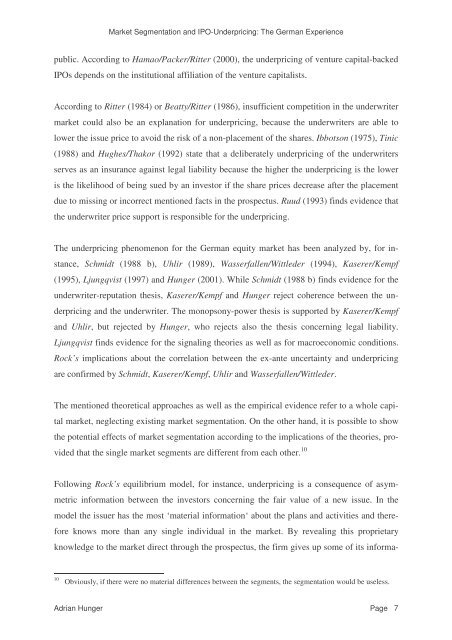Market Segmentation and IPO-Underpricing: The German Experience
Market Segmentation and IPO-Underpricing: The German Experience
Market Segmentation and IPO-Underpricing: The German Experience
You also want an ePaper? Increase the reach of your titles
YUMPU automatically turns print PDFs into web optimized ePapers that Google loves.
<strong>Market</strong> <strong>Segmentation</strong> <strong>and</strong> <strong>IPO</strong>-<strong>Underpricing</strong>: <strong>The</strong> <strong>German</strong> <strong>Experience</strong><br />
public. According to Hamao/Packer/Ritter (2000), the underpricing of venture capital-backed<br />
<strong>IPO</strong>s depends on the institutional affiliation of the venture capitalists.<br />
According to Ritter (1984) or Beatty/Ritter (1986), insufficient competition in the underwriter<br />
market could also be an explanation for underpricing, because the underwriters are able to<br />
lower the issue price to avoid the risk of a non-placement of the shares. Ibbotson (1975), Tinic<br />
(1988) <strong>and</strong> Hughes/Thakor (1992) state that a deliberately underpricing of the underwriters<br />
serves as an insurance against legal liability because the higher the underpricing is the lower<br />
is the likelihood of being sued by an investor if the share prices decrease after the placement<br />
due to missing or incorrect mentioned facts in the prospectus. Ruud (1993) finds evidence that<br />
the underwriter price support is responsible for the underpricing.<br />
<strong>The</strong> underpricing phenomenon for the <strong>German</strong> equity market has been analyzed by, for in-<br />
stance, Schmidt (1988 b), Uhlir (1989), Wasserfallen/Wittleder (1994), Kaserer/Kempf<br />
(1995), Ljungqvist (1997) <strong>and</strong> Hunger (2001). While Schmidt (1988 b) finds evidence for the<br />
underwriter-reputation thesis, Kaserer/Kempf <strong>and</strong> Hunger reject coherence between the un-<br />
derpricing <strong>and</strong> the underwriter. <strong>The</strong> monopsony-power thesis is supported by Kaserer/Kempf<br />
<strong>and</strong> Uhlir, but rejected by Hunger, who rejects also the thesis concerning legal liability.<br />
Ljungqvist finds evidence for the signaling theories as well as for macroeconomic conditions.<br />
Rock’s implications about the correlation between the ex-ante uncertainty <strong>and</strong> underpricing<br />
are confirmed by Schmidt, Kaserer/Kempf, Uhlir <strong>and</strong> Wasserfallen/Wittleder.<br />
<strong>The</strong> mentioned theoretical approaches as well as the empirical evidence refer to a whole capi-<br />
tal market, neglecting existing market segmentation. On the other h<strong>and</strong>, it is possible to show<br />
the potential effects of market segmentation according to the implications of the theories, pro-<br />
vided that the single market segments are different from each other. 10<br />
Following Rock’s equilibrium model, for instance, underpricing is a consequence of asym-<br />
metric information between the investors concerning the fair value of a new issue. In the<br />
model the issuer has the most ‘material information‘ about the plans <strong>and</strong> activities <strong>and</strong> there-<br />
fore knows more than any single individual in the market. By revealing this proprietary<br />
knowledge to the market direct through the prospectus, the firm gives up some of its informa-<br />
10 Obviously, if there were no material differences between the segments, the segmentation would be useless.<br />
Adrian Hunger Page 7


